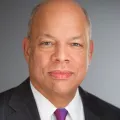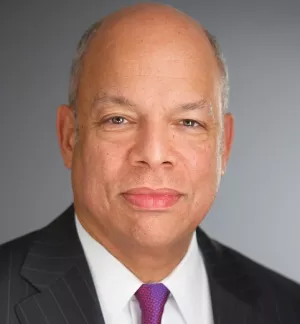Students, faculty and administrators of Liberty University, I am honored to be your convocation speaker this September 11, which is, as Franklin Roosevelt once said of December 7, 1941, a date that will live in infamy.
I am also honored to visit Liberty University because my family roots are here in Lynchburg, Virginia. Over a century ago my Johnson ancestors, many of whom were born into slavery, lived in this city. They saw the same sunrise, walked the same hills and breathed the same air as you do. My great great grandmother Julia Whiteley Branch and my great grandmother Winnie Lee Johnson are buried in the integrated Old City Cemetery in Lynchburg.
Across town in a much smaller colored cemetery lies my great grandfather Rev Charles Henry Johnson. Born a slave in Culpeper County in February 1859, Rev Johnson moved as a child to Lynchburg, grew up here, and graduated from Virginia Union University in Richmond in 1883. In 1890 Reverend Johnson founded the Lee Street Baptist Church in Bristol, Virginia, which is still there. Though he was a quiet, unassuming man, a writing of the period said “there is no more popular Baptist preacher in Southwest Virginia than Dr. Johnson.” My great grandfather pastored his church for 42 years until his death in 1932.
On the headstone at his gravesite a short distance from here is the simple inscription “The Reverend C.H. Johnson . . . A Good Life.”
Reverend Johnson never could have imagined his great grandson would be responsible for the security of the whole Nation. But, like my great grandfather, at the end of my life all I want is the simple epitaph: “A good life.” In my life I have tried to be a good husband, a good father, a good son, a good friend, a good member of my community, a good American, and a good Christian. To lead a good life.
For me, today marks a day of life and death. 9/11 happens to be my birthday: September 11, 1957 to be exact. It is also a day of great tragedy: September 11, 2001. The day an act of terrorism led to the death of 2,977 innocent people. Many of you students were not even born then. Most of the rest of you probably have no memory at all of that day.
I remember it like it was yesterday. I always will. I was in New York City that day and watched the tragedy unfold with my own eyes. The day changed my life. From that day I developed a determination to return to public service and national security. Little did I know then that years later I would lead the Department of Homeland Security, which didn’t even exist on September 11, 2001.
9/11 was a tragedy, but out of that day we saw great acts of courage, selflessness, heroism and leadership. And, on this 19th anniversary of 9/11, leadership is what I want to talk to you about today.
What does it take to be a good leader? As someone who led an organization of 230,000 people, and who has worked with a number of different leaders in a number of different contexts, I know something about this.
The traits of a good leader exist across many fields: whether you are a pastor, a plant manager, a sales team leader, a police or fire chief, a university president, a commander of soldiers in combat, a mayor, a governor, or a president.
It is a sad state of affairs today that the public has come to expect little of our political leaders when it comes to character and morality.
We no longer expect our political leaders to tell us the truth. We no longer expect our political leaders to play by the rules. Our expectations of our political leaders have sunk so low we now accept from them personal behavior that would be unacceptable for our children, our students, our employees, or cadets, soldiers, sailors, airmen or marines under our military command.
Too often politicians pay no price for a lie, or even a crime. Instead, we conveniently overlook the bad behavior by saying “but I like his polices,” or “the economy is doing great.”
This decoupling of a leader’s personal character from the general environment in which he or she governs works only to a point. Trivial times may tolerate trivial leaders. But ask any military commander who has led people into battle, and they will tell you that in times of great stress, the poor character of a leader will have a corrosive effect on an entire unit. Character, integrity and morality do matter.
Here are five traits of a good leader:
Number One: Always tell the truth. Tell the truth when it is easy. Tell the truth when it is hard. In times of crisis, a leader who is not believed will not be followed. The great mistake that our political leaders make about the people they serve is that we can’t handle the truth; that we should only be told what we want to be told. But the American people are adults, not fools. We do not expect our leaders to have all the answers or to make all the problems disappear. We expect them to tell us the truth about the problems and dangers we face. Lessons in history, and in recent times, teach us that if our leaders simply tell us the truth about the problems we face, and what is required of us to solve them, we will respond.
Two: a good leader builds consensus, and does not simply find consensus. The famous quote attributed to Mahatma Gandhi: “there go my people. I must follow them, for I am their leader,” was made in jest by one of the greatest leaders of the 20th century. But the sad reality is that too often there are those who aspire to lead by following polls and focus groups. Still worse, leaders too often seek to gain attention by pandering to our fears, our suspicions and our prejudices. A true leader does not just curse the darkness, but lights a candle, and shows the way to a higher, better place.
Three: Be inclusive. Surround yourself with people willing to tell you hard truths, and will not be afraid to give you advice you don’t want to but need to hear. Surround yourself with people who hold a range of views and attitudes. Encourage them to speak their mind. It is out of that type of atmosphere of deliberation and inclusion that the best, healthiest decisions are made by a leader. It is in a bunker of fear and retribution, where everyone simply nods their heads yes to survive, that the worst decisions are made. A leader who believes he has everything to teach and nothing to learn can never be a true leader.
Four: Never ask someone to do something you wouldn’t do yourself. I could not take a child away from her mother at the border; nor could I ask an immigration enforcement official to do the same thing. Set the example. In my three years as Secretary of Homeland Security, I was determined to raise morale within that large 230,000-person agency. The single thing I did that was the most popular among the workforce was to put on a blue TSA uniform and work the security line for an hour at BWI airport. The TSA agents loved it: the undercover boss was willing to endure the unpleasant behavior of passengers who don’t like emptying their pockets, taking off their shoes and taking off their belts. Except for a member of Congress passing through the airport, no traveler that day recognized me. Finally, I pointed to the patch on my right soldier and said to someone: “do you realize I am the head of this entire department?” The nice lady about to catch a flight to North Carolina responded to me “congratulations on your promotion, young man.”
Five: the Golden Rule. The Golden Rule applies to everyone, especially those who aspire to lead others. Treat others as you would have them treat you. Treat others as you would have them treat your wife, your husband, your parents, or your children. Begin every new encounter on the assumption that there is good in every person you meet. Particularly at this time of heightened racial tension in this country, respect differences among people you meet – cultural, racial, religious, ethnic and political. Recognize that diversity is the opportunity to learn and expand your own horizons. Disrespect for those who are different reflects a small heart and a closed mind.
I have talked today about the traits of a good leader. There are also the traits of a good follower. All of us have certain basic responsibilities as citizens. For those eligible to do so, this includes the right and the responsibility to vote.
More than that, being a good citizen means being an informed citizen. Social media enables you to hold the entire world in your hand. It also enables you to go to all sorts of sources for news and information—some of them reputable, objective and established; others are not. There are far too many siloed places to go to on the internet, posing as “news,” that do no more than re-enforce our own predilections, and have few standards for truth and accuracy. They are quick and easy, and they are seductive. As an adult participant in this democracy, you have a duty to work a little harder, scrutinize what you see, look past the garbage, enlarge your attention span, find the truth, and be informed. As citizens you too have hard choices to make. It’s the essence of a democracy, in which the people choose their leaders, and leaders govern only with the consent of the governed.
Finally, as part of being a good citizen, please consider public service, in some capacity -- whether its service to your city, your state, your community, your church, or your country -- in uniform or as a civilian. Within almost all of us is the basic human desire to serve and help others. Though I have been in public service for only 12 of the 37 years of my professional life, those 12 have been the most gratifying. And no matter what I do for the rest of my life, my public service will be the first paragraph of my obituary.
Being a good citizen is part of leading a good life. Thank you.
Johnson, Jeh. ““A Good Life” – Liberty University Convocation Address.” September 11, 2020


